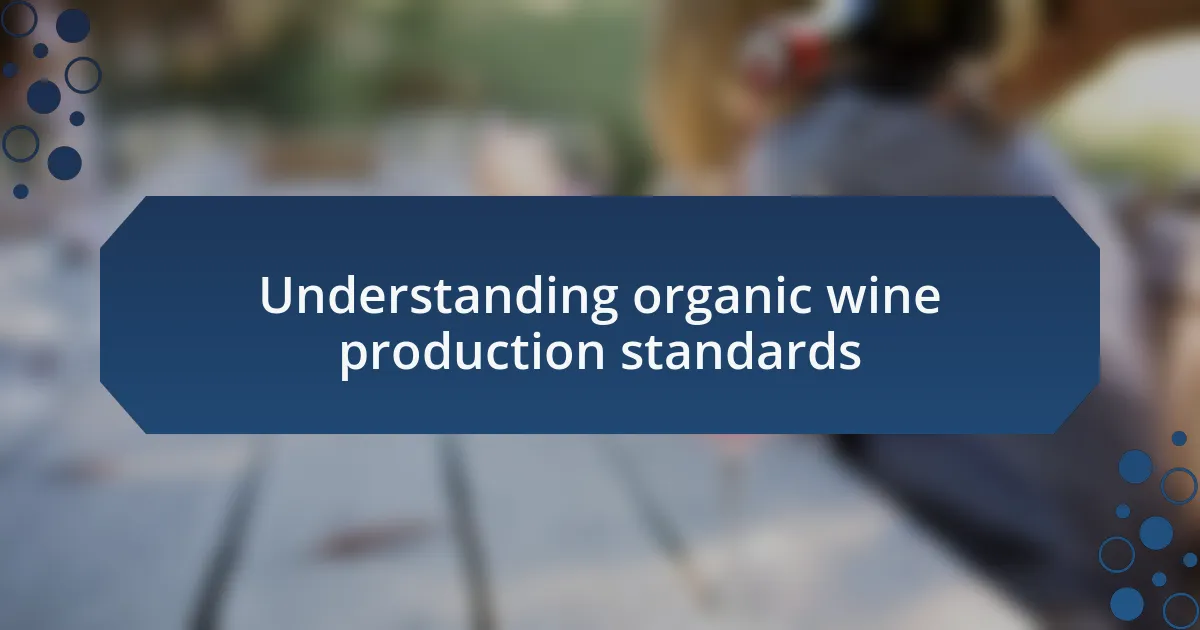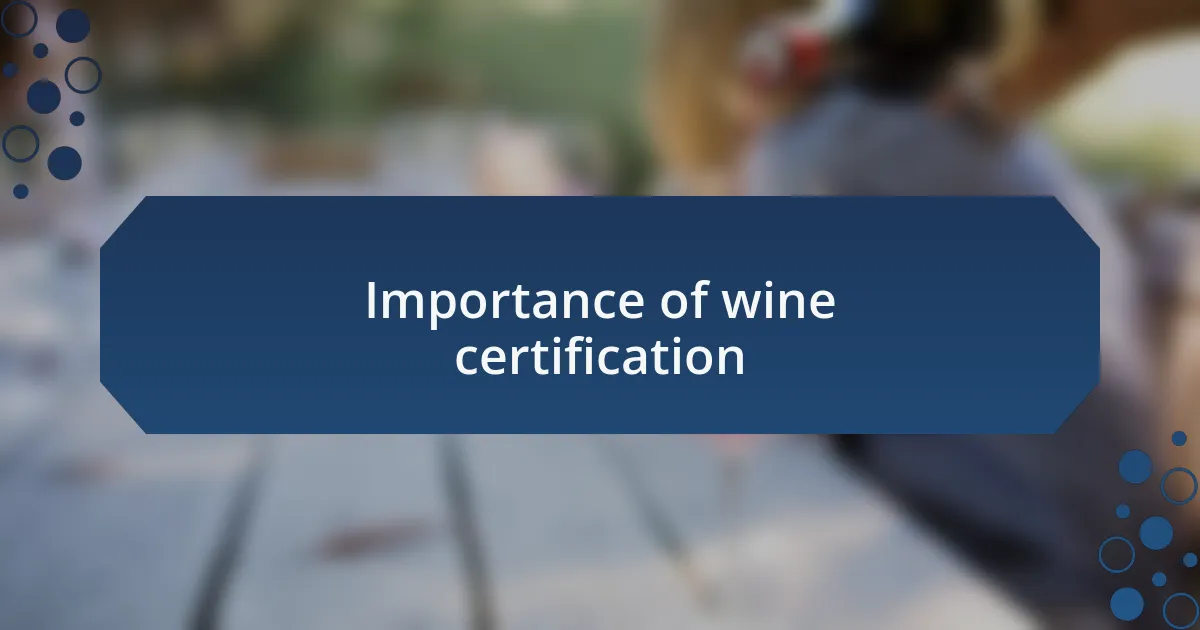Key takeaways:
- Organic wine production standards vary by country, emphasizing the absence of synthetic chemicals and the importance of land healing before quality wine production.
- Wine certification ensures adherence to strict organic practices, building consumer trust and fostering transparency in the industry.
- The certification process requires thorough documentation and regular inspections, reflecting the commitment to sustainable practices and enhancing wine quality.
- Choosing the right certification involves aligning personal values with sustainable practices, highlighting the importance of community and mentorship in the organic wine industry.

Understanding organic wine production standards
Understanding organic wine production standards is crucial for both producers and consumers. I remember my first visit to an organic vineyard, where I was awed by the lush vines and the absence of synthetic chemicals. It made me wonder: how do these practices not only meet organic standards but also enhance the flavor of the wine?
Organic wine production standards often vary by country, shaping how vineyards cultivate their grapes. In the United States, for example, the USDA requires vineyards to be free from synthetic pesticides and fertilizers for at least three years before they can label their wine as organic. This makes me think about the patience required in organic farming—how the land needs time to heal before it can produce grapes that truly reflect its natural terroir.
Moreover, the standards encompass not just what goes into the vineyard but also what happens during the winemaking process itself. For instance, the use of added sulfites is restricted in organic wines, prompting winemakers to explore alternative methods for preserving their creations. Isn’t it fascinating how these limitations can inspire creativity and lead to unique flavor profiles that tell the vineyard’s story?

Importance of wine certification
Wine certification holds significant importance in the realm of organic wine production, ensuring that the practices used meet strict standards. I recall my first encounter with a certified organic winery, where the winemaker passionately discussed the rigorous processes involved in achieving that certification. It became clear to me that certifications are not just labels; they represent a commitment to sustainable and ethical practices that resonate with environmentally-conscious consumers.
For consumers, wine certification serves as a trusted guide, providing assurance that the product reflects genuinely organic methods. I remember attending a tasting event where each bottle bore a certification label. It sparked conversations about the science behind organic practices, and I realized how empowered I felt knowing I was choosing products that aligned with my values. Isn’t it remarkable how a mere label can transform the shopping experience into a meaningful connection with the land?
Moreover, certifications foster transparency within the industry, promoting integrity among producers. During a vineyard tour, I learned how these standards not only safeguard consumer interests but also encourage winemakers to innovate and improve their practices continually. It made me appreciate that every certified bottle of organic wine represents a journey toward excellence—a narrative of care, passion, and dedication to both the earth and its bounty.

Key criteria for certification
Meeting the criteria for wine certification involves an array of specific practices aimed at maintaining organic integrity. For instance, during my exploration of various vineyards, I discovered that one key criterion is the prohibition of synthetic pesticides and fertilizers. Witnessing how a winemaker utilized natural alternatives, like beneficial insects, was eye-opening; it underscored the lengths to which producers go to uphold these standards. Have you ever wondered about the impact of those choices on the final product’s flavor?
Another essential aspect is the certification process itself, which often requires thorough documentation and regular inspections. I once visited a winery where the staff passionately shared their meticulous record-keeping practices. It amazed me to see how every vineyard decision, from soil health to harvesting methods, is carefully logged and evaluated. This dedication not only builds trust but also enriches the wine, creating layers of character that reflect the vineyard’s unique environment.
Moreover, adherence to sustainable water use and management practices can also be a deciding factor for certification. I recall a winery in a drought-prone region taking innovative measures to conserve water, which ultimately set them apart in the certification process. Their commitment to environmental stewardship genuinely inspired me; it made me ponder how essential it is for all winemakers to embrace such responsibilities. Isn’t it fascinating how these criteria not only benefit the environment but also enhance the quality of our beloved wines?

Researching certification options
When diving into the world of wine certification, I found that research was foundational. I started by an online search, comparing various certification bodies and their requirements. Each organization had its own set of standards, leading me to ponder: how does one select the most credible source? This was important to me, as I sought a certification that truly reflected commitment to organic practices.
I recall visiting a local winery that was certified by a widely recognized organization. The owner explained the rigid guidelines they followed, focusing on everything from grape handling to bottling. Seeing the pride in her eyes made me realize that certification isn’t just a label; it symbolizes dedication to quality, sustainability, and consumer trust. This reinforced my belief that a thorough understanding of available certifications is essential, as it directly impacts how the wine is perceived by enthusiasts like me.
As I delved deeper, I came across forums and communities of organic wine producers. Engaging with them opened my eyes to the diverse perspectives on certification. I was surprised to learn how personal experiences shaped their choices—some emphasized community involvement in the certification process while others pointed to the importance of creating a transparent relationship with consumers. Isn’t it intriguing how multifaceted the journey to certification can be, influenced by individual values and local environments?

My selection process for standards
Once I narrowed down the certification bodies, I found myself weighing their values against my own beliefs about organic wine production. I vividly remember sitting at my kitchen table, sorting through brochures filled with green logos and varying mission statements. It struck me how critical it was for the standards to resonate personally; after all, I wanted my certification to reflect not just a process, but a passion for truly organic practices.
As I examined the intricacies of each standard, I experienced a mix of excitement and apprehension. One evening, discussing my findings with a friend over a glass of organically-produced Pinot Noir, I realized how deeply personal this choice was. I couldn’t help but ask myself: what does authenticity mean to me? This reflection led me to prioritize certifications that demanded rigorous environmental stewardship and fostered community partnerships.
Ultimately, my selection process became a blend of analytical thinking and emotional resonance. I found myself drawn to certifications that not only ensured adherence to organic methods but also embraced transparency and education. When I stumbled upon an organization that promoted collaboration among producers, it felt like finding a kindred spirit in the industry. Who wouldn’t want to align with a community that values shared learning and sustainable growth?

Evaluating the impact of certification
Evaluating the impact of certification involves a careful look at how these standards affect not just the wine itself, but the entire community around it. When I started diving into the actual effects of various certifications, I was surprised by how interconnected everything felt. One day, as I attended a local farmers’ market, I witnessed firsthand how producers proudly displayed their certified organic labels, sparking conversations about sustainability. It was a powerful reminder that these certifications could catalyze change in consumer awareness and demand for ethical practices.
I’ve often wondered about the influence of certification on consumer behavior. During a tasting event, I found myself discussing these standards with fellow wine enthusiasts. Many expressed a willingness to pay a premium for wines bearing stringent organic certifications. This experience made me appreciate that certification isn’t merely a badge; it can elevate the perception of the wine and instill trust in customers seeking quality and integrity.
Reflecting on these interactions led me to realize that certification has implications beyond individual choices; it shapes the future of organic wine production. As I engaged with producers, I felt their pride in upholding rigorous standards that not only assured quality but also promoted a narrative of sustainability. Isn’t it fascinating how these certifications forge connections among growers, consumers, and the environment? In many ways, they become a vehicle for shared values and collaborative efforts toward a greener future.

Lessons learned from my journey
Throughout my journey, I’ve learned that choosing the right certification standards is not just about compliance; it’s about aligning values with practices. I remember attending a workshop focused on organic certification processes, feeling both excited and overwhelmed. The complexity of the regulations initially daunted me, but as I worked through each step, I discovered how meticulous they ensure quality and authenticity. Each detail matters, and I realized that a hasty decision might compromise the integrity of what I hoped to achieve.
One of the most profound lessons came during a conversation with a winemaker who transitioned to organic practices. I could see the passion in her eyes as she shared how certification transformed not only her vineyard’s operations but also her community’s perception of sustainability. This experience left me pondering: How often do we underestimate the ripple effects of our choices? The certification process is a commitment that demands patience, and I’ve learned that embracing this journey leads to deeper connections within the industry.
I’ve also discovered that mentorship is invaluable. Early on, I sought advice from experienced professionals. Their willingness to share insights reinforced my understanding of the importance of certification in establishing credibility. This collaborative spirit empowered me and serves as a reminder that, at the heart of this endeavor, we are all in it together, striving for a better future. Each lesson has shaped not just my approach to wine certification, but my perspective on community and responsibility within organic wine production.